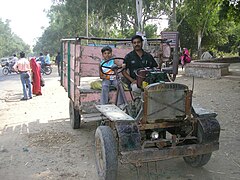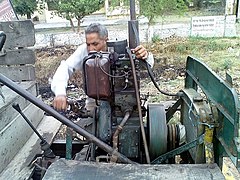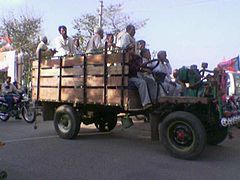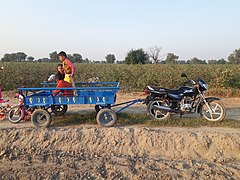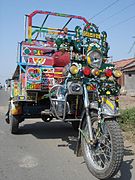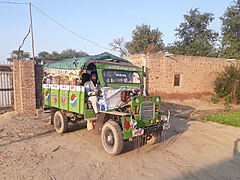Jugaad
Jugaaḍ or jugaaṛ (in Hindustani: जुगाड़ / جگاڑ) is a non-conventional, frugal innovation, in Indian subcontinent.[1] It also includes innovative fixes or a simple workarounds, solutions that bend the rules, or resources that can be used in such a way. It is considered creative to make existing things work and create new things with meager resources.
Jugaad is increasingly accepted as a management technique[2][3] and is recognized all over the world as a form of frugal innovation.[4] Companies in Southeast Asia are adopting jugaad as a practice to reduce research and development costs.[5] Jugaad also applies to any kind of creative and out-of-the-box thinking or life hacks that maximize resources for a company and its stakeholders.
According to author and professor Jaideep Prabhu, jugaad is an "important way out of the current economic crisis in developed economies and also holds important lessons for emerging economies".[6]
Improvised vehicles

Jugaad can also refer to a homemade or locally made vehicle in India, Pakistan and Bangladesh. They are made by local mechanics using wooden planks, metal sheets and parts taken from different machines and vehicles.
One type of jugaad is a quadricycle, a vehicle made of wooden planks and old SUV parts, variously known as kuddukka[clarification needed] and peter rehra in Northern India. However, jugaad is also used as a term for any low-cost vehicle which typically costs around Rs 50,000 (US$674.77).[7] Jugaads may be powered by a diesel engine originally intended to power agricultural irrigation pumps. They are known for poor brakes, and cannot go faster than about 60 km/h (37 mph). The vehicle often carries more than 20 people at a time in remote locations and poor road conditions.
Though no statistical data is available, it is reported that there are a number of instances of failing brakes, requiring a passenger to jump off and manually apply a wooden block as a brake. As part of research for his 2013 book, Innovation and a Global Knowledge Economy in India, Thomas Birtchnell, a lecturer of Sustainable Communities at University of Wollongong, Australia, found that of 2,139 cases of road traffic casualties in 72 hours at J N Medical College hospital in Aligarh, 13.88% of pedestrian casualties were due to jugaad. It was stated by Minister of Road Transport and Highways Pon Radhakrishnan that jugaad do not conform to the specifications of a motor vehicle under the Motor Vehicles Act, 1988.[8] These vehicles hence do not have any vehicle registration plate and they are not registered with the Regional Transport Office (RTO). Hence, no road tax is paid on them, neither there exists any official count of such vehicles.
Jugaad vehicles are not officially recognized as road-worthy, and despite a few proposals to regulate them, vote-bank politics have trumped safety concerns. The improvised vehicles have now become rather popular as a means to transport all manner of burdens, from lumber to steel rods to school children.[9] For safety reasons the Government of India has officially banned jugaad vehicles.[10]
Another type of jugaad called bike-rehra or motorcycle-rehri, a motorcycle, moped or scooter modified into motorized trikes are used in the northern states of India, especially Punjab.[11][12]
Another type of jugaad called phat-phatri rickshaw or phatphatiya rickshaw, WWII-era Harley Davidson motorcycles modified into motorized trikes which were earlier used in New Delhi.[13]
A variant of the jugaad vehicle in Tamil Nadu state of Southern India is the meen body vandi. This roughly translates to 'fish bed vehicle' because they originated among local fishermen who needed a quick and cheap transport system to transport fish. It is a motorized tri-wheeler (derived from the non-motorized variant)[14][15] with a heavy-duty suspension and a motorcycle engine—typically recycled from Czech Yezdi or Enfield Bullet vehicles. Its origins are typical of other jugaadu innovations—dead fish are typically considered unhygienic, and vehicles that carry them cannot be typically used to carry anything else. Similar vehicles can be found throughout much of Southeast Asia.[16]
Another variant of the jugaad called chakkda rickshaw, a motorcycle modified into a tri-wheeler with truck wheels in the rear is used in the Gujarat state of India.[17]
A variant of jugaad in Pakistan is a motorcycle made into a motorized trike called chand-gari meaning "moon vehicle" or chingchee after the Chinese company Jinan Qingqi who first introduced these to the market.[18]
Today, a jugaad is one of the most cost-effective transportation solutions for rural Indians, Pakistanis, and Bangladeshis.
-
Jugaad vehicle peter rehra powered by an agricultural water pump engine
-
Jugaad engine being hand-started
-
Jugaad vehicle carrying passengers to a political rally in Agra, India
-
Bike-trolley, a jugaad trailer for motorcycles
-
Chakkda rickshaw in Gujarat, India
-
Motorised meen body vandi
-
Chand-gari rickshaw in Pakistan
-
Diesel engine converted into a peter rehra vehicle in Punjab, India
-
Peter rehra, a local vehicle made with a diesel engine in Punjab, India
See also
Notes
- ^ "जुगाड़" [Creative improvisation]. aamboli.com. Archived from the original on 12 May 2017. Retrieved 28 December 2021.
- ^ "Jugaad: A New Growth Formula for Corporate America". Harvard Business Review Blog Network. 25 January 2010.
- ^ "Bricolage in R&D Settings". IEEE Transactions on Engineering Management. doi:10.1109/TEM.2020.2997796. hdl:11343/241260. S2CID 225681071.
- ^ "India's Next Global Export: Innovation". Bloomberg Businessweek. 2 December 2009.
- ^ "A snip at the price". The Economist. 28 May 2009.
- ^ "Cambridge expert says Indian 'jugaad' is lesson to world". 8 November 2013.
- ^ "Rural India's jugaad for cheap travel – Livemint". livemint.com. 25 March 2008. Retrieved 9 April 2016.
- ^ "One hack of a vehicle". The Indian Express. 25 October 2015. Retrieved 9 April 2016.
- ^ "Bal Mandir Public School Transportation".
- ^ "Govt issues order to seize jugaads". The Times of India. Archived from the original on 30 March 2013. Retrieved 12 July 2013.
- ^ "जुगाड़ू रेहड़ों का विधायक तलवाड़ और पार्षद मनीषा ने किया उद्घाटन".
- ^ "Punjab CM Bhagwant Mann 'unhappy' with transport dept decision to ban use of 'motorcycle rehri'".
- ^ "Phat-Phat: A reincarnation of Harley Davidson".
- ^ "Indian Tripurteurs A7".
- ^ Narayanan, Vivek (18 August 2017). "The hazards of native ingenuity". The Hindu.
- ^ "Motor Tricycle-Motor Tricycle Manufacturers, Suppliers and Exporters on alibaba.com".
- ^ "The Chakda: India's True Jugaad Vehicle – be on the Road | Live your Travel Dream!".
- ^ "Motorcycle rickshaws to be replaced with electric bikes".
Further reading
- Radjou, Navi; Prabhu, Jaideep; Ahuja, Simone; Roberts, Kevin (2012). Jugaad Innovation: Think Frugal, Be Flexible, Generate Breakthrough Growth. Wiley. p. 288. ISBN 978-1-1182-4974-1.
- Krishnan, Rishikesha T. From Jugaad to Systematic Innovation: The Challenge for India.
- Mitra, Barun S. (26 January 1995). "India's 'Informal' Car". Asian Wall Street Journal. p. 10.
- McClellan, Philip (11 October 2012). "Is Jugaad Going Global?". "India Ink" blog. The New York Times.
- Tiwari, Rajnish; Herstatt, Cornelius (December 2012). "Open Global Innovation Networks as Enablers of Frugal Innovation: Propositions Based on Evidence from India" (PDF). Technology and Innovation Management. Working Paper No. 72. Hamburg University of Technology. Archived from the original (PDF) on 3 March 2016. Also published as: Tiwari, Rajnish; Herstatt, Cornelius (2012). "Frugal Innovation: A Global Networks' Perspective". Die Unternehmung. 66 (3): 245–274. doi:10.5771/0042-059X-2012-3-245.




